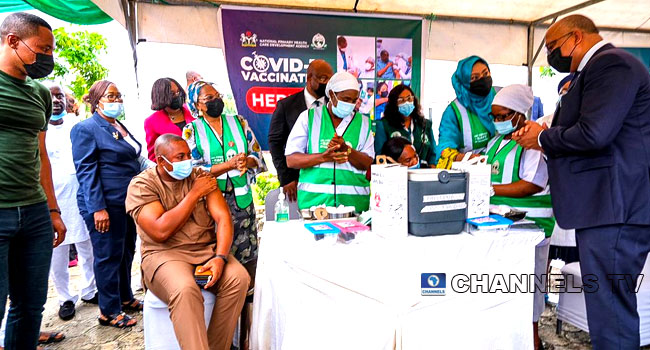By Asmau Ahmad
The Nigeria’s Federal Government said a total of 71,477,351 Nigeria residents have been fully vaccinated with COVID-19 vaccines as at April 1, 2023, representing 61.6 percent of the targeted eligible population.
Also, the government said another 82,474,931 people have received at least one dose of the vaccine.
In a bid to reverse poor health indices and provide Universal Health Coverage in Nigeria, the federal government said it has so far revived o 4,000 Primary Healthcare Centre (PHCS) nationwide.
The Minister of Health, Dr. Osagie Ehanire, disclosed this at a media briefing to commemorate the World Health Day and World Health Workers Week held yesterday.
On efforts to check COVID-19, the minister said the National Healthcare Development Agency (NPHCDA), has as of April 1, 2023, fully vaccinated 71,477,351 Nigeria residents with COVID-19 vaccines.
This represented 61.6 per cent of the targeted eligible population and another 82,474,931 people have received at least one dose of the vaccine.
Dr Ehanire said the country was still implementing the SCALES 3.0 strategy using Johnson and Johnson Covid-19 vaccine, “until we achieve at least 70% coverage needed for strong herd immunity against the COVID-19 virus.
He said the federal government had initiated the revitalisation of about 10,000 primary healthcare centres nationwide.
“As exemplified by the revitalised Kuchigoro PHC in the Federal Capital Territory, FCT. More than 4,000 PHCs have been revitalised so far, while working towards a new PHC model equipped will staff quarters, solar power, and assured potable water supply, to enable 24+hour service provision to citizens,” he said.
Ehanire said these steps taken by government have improved primary healthcare services in Nigeria and reduced challenges women face in childbirth and addressing home emergencies
The minister also explained that the Basic Health Provision Fund (BHCPF) was established by the National Health Act (2014) to provide and finance essential health services that address our poor health indices at Primary Health centres, to poor and vulnerable citizens, especially in rural areas.
According to him, the effort includes; provision of emergency medical services with a rural Ambulance System (RAS) under a National Emergency Medical Service and Ambulance System (NEMSAS), at no charge at point of care.
These initiatives are undergoing pilot testing in some states. Speaking further on the achievement of the administration in the health sector, Ehanire Nigeria’s immunization profile has recorded a significant improvement from 33 percent in 2016 to 57 per cent in 2021, despite Covid-19 pandemic distractions.
He added that Nigeria has remained free of wild polio virus (WPV) since obtaining certification in August 2020, over six years ago.


